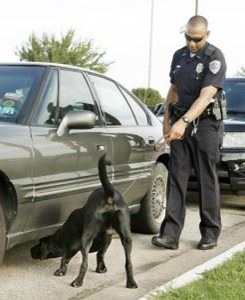In the Dallas-Fort Worth and Denton area as well as throughout Texas we are seeing an increase in the use of police drug-sniffing dogs at all levels of law enforcement. Dogs can be readily trained to provide useful and vital services to the law enforcement community. Those in which the officer claims the animal has been trained to sniff out illegal narcotics or marijuana pose the greatest threat to our Fourth Amendment protections against unreasonable searches and seizure by law enforcement.
Probable Cause & K9 Drug Searches
Positive canine "alerts" are treated as per se probable cause in most states and in the federal courts including the US Supreme Court. This gives a police officer the ability to intrude into the private spaces of another with no judicial oversight or warrant.
The terminology "trained," "reliable," and "certified" appear throughout judicial opinions handed down over the years relating to the use of drug-sniffing dogs. With no regulation, supervision, or oversight of this new Drug Dog Industry the opportunities for mischief and police misconduct are immense.
Who Can Use Drug-Sniffing Dogs?
Nearly every city, state, and federal law enforcement agency in Dallas Tarrant and Denton County have or have access to drug-sniffing dogs. The Texas Department of Public Safety also has a number of dogs they routinely use in what they consider drug corridors along Highway US 287 east of Wichita Falls to North of Amarillo and Highway US 87 north of Interstate 40.
Police are heavily focused on harassing motorist coming from Colorado where their marijuana laws are rational in hopes they can catch unwary travelers with contraband. Most mischief occurs with vehicle searches of people stopped on contrived allegations hard to refute, such as they were traveling 1-2 miles an hour over the speed limit. Police officers cannot bring drug dogs onto a person's property to search for evidence without first obtaining a warrant to conduct the search, according to a recent Supreme Court Decision.
Drug-Sniffing Dogs & Your Fourth Amendment Rights
Most of us know that any dog with proper energy and motivation can be trained to do just about anything. Any dog owner can tell you they can use subtle physical or audible clues to induce a dog to bark, rollover, sit, play-dead, fetch, and perform countless other behaviors. Dogs have even been trained to sniff out bedbugs in dwellings and to warn their owner of an impending seizure by the smell of their breath. The contribution of service dogs to society is immense. The threshold question should be whether our Fourth Amendment protections should be entrusted to a dog?
Police dogs are motivated in the same ways as your family pet. They respond to praise, treats, and toys just like any other dog. A dog's only desire is to receive his owner's praise, usually accompanied by a toy or treat. This does not occur for the dog when called upon to give an alert if it fails to do so. Likewise, there is no way to recall that reward or praise when it is ultimately learned the dog gave a false alert and nothing was found after a citizen has been deprived of their Fourth Amendment Right to Privacy.
While dogs can be trained to react to certain odors with some degree of accuracy dogs are not infallible. Nor are they able to tell us what is causing them to react. In reality a canine alert is nothing more than a subjective interpretation of the dog's demeanor by the dog's handler through their interaction with the dog. However there are things to watch for.
How Do You Know When the Police Dog Smells Drugs?
The most common question asked in discussions regarding drug dog searches is how do you know when the dog has "Alerted" to the smell of contraband? The truth is you really don't. You only know the dog is doing what it believes it has been trained to do. The training the dogs receive is to either give a passive or aggressive alert when it detects certain odors it is trained to detect.
The three main drug-groups dogs are most typically trained to detect are:
- Opiates
- Marijuana (Cannabis)
- Amphetamines
So typically these dogs would be trained to find whole plant cannabis, cocaine, crack, heroin, amphetamines and methamphetamines. Also a lot of drugs such as ecstasy, MDMA and MDAA are cut with one of the substances so one would expect a dog to alert on them as well. The objective way of determining whether a dog has given a proper alert depends on how the dog is been trained.
A dog trained to give an aggressive alert can be observed biting, pawing, scratching, or attempting to penetrate a container to retrieve the substance. You are not likely to see a dog trained to detect explosives alert in this manner. The most common method trained for sniffer dogs to give an alert is a passive alert.
They will give a passive alert in one of two ways: Depending on their training they either sit intently next to the area they alerting on or they will train their nose right on the area they are detecting the odor. During this time you will typically also see them looking toward the handler to be sure they have their attention. If the so-called "Alert" does not look like one of these three things what you really have is a dog just being a dog. Rarely are open-air sniffs and alleged alerts by dogs videotaped in Texas. It comes down to the word of the officer speaking for the dog.
Can Drug-Sniffing Dogs Give False Alerts?
The legal charade law enforcement is playing with our courts and consequently the citizen's deprivation to their lawful right to privacy becomes apparent when you begin to ask questions about the reliability of these police dog alerts. False alerts routinely occur and this fact is concealed by law enforcement.
A false alert is an instance where the animal has alerted to the smell of contraband yet none was found. For the most part when this occurs no record is made of the occurrence. When the handler is pressed for an explanation they will often say the dog alerted on a "residual odor." This explanation is ridiculous in a world were drug users and non-drug users alike share:
- handrails
- luggage racks and compartments
- water-fountains
- vending machines
- chairs
- elevator-buttons
- telephones
- computers
- currency
- etc.
In almost all instances of a false alert no evidence was ever found there was ever a compound present that would've left a residual odor. A dog that allegedly alerts on a "residual odor" should be deemed an unacceptable dog to be used to deprive the citizens of their lawful right to privacy or property. Also remember a "residual odor" allegation comes in right handy for police engaged in roadside shakedowns of citizens for their cash under the alleged asset forfeiture statutes. They use the allegation the dog smelled a residual odor on money as their probable cause to seize it.
How Accurate are Drug-Sniffing Dogs?
When the police are honest in reporting the actual results of alerts it is clear that many, if not the majority alerts, are false alerts. A 2007-2009 study by the Illinois Department of Transportation related to police K-9 searches revealed an accuracy rate of searches were drugs or paraphernalia were indeed found to be as low as 32% with some agencies participating in the survey.
In a recent Federal lawsuit filed by officers in Nevada, their complaint alleges that the drug-sniffing dogs used by troopers in a highway drug interdiction program were intentionally being trained to operate as so-called trick ponies, or dogs that provide officers false alerts for the presence of drugs. The dogs were being trained to alert their handlers by cues, instead of by picking up a drug's scent by sniffing, the complaint said. When a dog gives a false alert, this resulted in illegal searches and seizures, including money and property, the complaint said.
False alerts by their drug-sniffing dogs aren't properly documented or investigated by Texas Police. The dog would be rendered worthless if found to be unreliable by the courts. The entire police canine industry is also rife with other problems. To open a "Canine Training Academy" where officers and their dogs are trained you need only hang out a sign and print certificates. There is no independent review or accreditation of these programs. There are rarely audits to see how a canine and their handler are doing once they hit the field.
Most agencies consider once an officer and their dog are trained they're forever trained. In short, our courts are allowing the government to end run the Constitution and replace the requirement of judicial oversight of searches of citizens through the use of Mutt and Jeff. Another common problem is citizens are routinely being detained for periods that are longer than is lawfully permissible while awaiting the arrival of a dog.
Without further reasonable suspicion or probable cause and officer cannot detain a citizen for periods longer than would be reasonably expected for them to run their customary checks and take remedial action based upon their original reason for the stop, such as run their customary check for warrants and driver's license status and issue a warning or citation and send the motorists on their way. Delays of motorist in stops for routine traffic violations lasting longer than 15-20 minutes should be immediately suspect. And denying an officer permission to search is never probable cause to do it anyway.
What to Do if You are Defending a Drug Case
Criminal defense attorneys in the Dallas and Fort Worth area need to be particularly diligent in defending their clients anytime a drug-sniffing dog has been used as probable cause for a search, seizure, or drug crime arrest. Fertile evidence for an Evidence Suppression Hearing can be found if you will take the time to dig. First, you need to subpoena all available videos that might have captured the search to see if an actual alert can be observed.
You need to subpoena all the purchase and training records and logs concerning the dog. You need to subpoena the training and disciplinary records of the handler. You need to subpoena the veterinary records of the dog. You should also subpoena records from computer-aided dispatch and mobile data terminals to determine the time your client was actually stopped and the time the dog arrived. And lastly, we need to take the time to educate our courts that a canine alert alone should never equal probable cause.
Questions? Our Fort Worth drug attorneys offer free consultations: (817) 349-7118.

